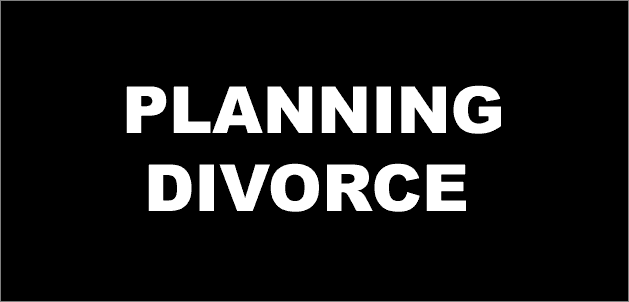
Planning Your Divorce in Georgia
Having a Divorce Exit Strategy is Critical
Planning your divorce is an extremely smart thing to do. This is not to say that your divorce is going to go exactly as you plan. What it does for you is give you a realistic view of what to expect. You need to address elements that affect your life during and after your divorce. Without a plan you are setting yourself up for a highly stressful and expensive divorce, and problems in your post-divorce life. You need to envision how your life will change, and what you can do to affect a better outcome.
For Better or Worse is now going to apply to your life during and after a divorce. Planning your divorce can give you more control of the situation, and facilitate better post-divorce circumstances.
Pre Divorce Financial Planning
General Finances
When you file for divorce, money immediately becomes a hot topic. You need a plan to handle all available cash, convertible instruments (stock, cryptocurrency, etc.), investment funds and credit cards. Without a temporary order your spouse can empty bank accounts, sell off investments and max out credit cards. You could be left with no money in-hand, and now part owner of newly acquired debt. You need to speak with an attorney before you find yourself in this predicament.
Child Support
Without a court order a parent may decide to not lend direct financial support to their children. Some parents try to create a financial hardship on their spouse, and sometimes try to prove the other parent is incapable of taking care of the children. During the divorce process, a lack of child support can be devastating. A divorce lawyers can advise you on the potential child support you may be able to receive or can expect to pay.
Spousal Support
Without a court order a spouse is not legally obligated to financially support the other spouse. If money is already tight your spouse is very likely to keep any money they have to support their lifestyle. A lawyer can help you to understand what you may be able to get, or have to pay, via a temporary support order.
Living Arrangements
If you're the person staying in the marital home you need to know how you're going to pay the rent or mortage, utilities and other expenses. Without a temporary order requiring support, the spouse that leaves can stop paying rent or mortage obligations. This can quickly harm your credit and lead to a foreclosure - forcing you to find a new place to live.
If you're the person who is moving out you need to think ahead to where you will live during and after your divorce. You will come to realize that it is not easy to find a decent place to live with a short term agreement. Additionally, temporary spousal or child support orders can leave you with a very tight budget for housing. You may be required to have a separate furnished bedroom for your child's overnight visitation. You need to carefully think through what you need and can afford.
Although you may consider it "temporary housing" the place you choose may be your home for longer than expected. You need to consider things such as:
- What will my budget be? What can I afford?
- Where can I get a short term lease or rental agreement?
- Will I have extra costs for new utilities accounts?
- Is this reasonably close to my job and children?
- Will I be able to accommodate my children during visitation?
- What other expenses will I incur? (housewares, kitchenware, etc.)
Child Custody and Visitation
A lawyer will propose temporary child custody and visitation arrangements as part of the divorce filing. The temporary order will not necessarily reflect what will become final but it will affect your life until the divorce is final. As part of your divorce plan you need to consider custody and visitation schedules, and the environment in which children will live. You need to consider how you will manage child care, transportation to and from school, events and extracurricular activites.
Child Related Expenses
During the time it takes to get a divorce the responsiblity for paying certain expenses can cause problems. Your plan should include assignment of responsibility to pay health insurance, medical expenses not covered by insurance, prescriptions drugs, dental and eye care, clothing, extracurricular activities and more.
Before you file for divorce, you need to consult with a lawyer to protect yourself and your children.
